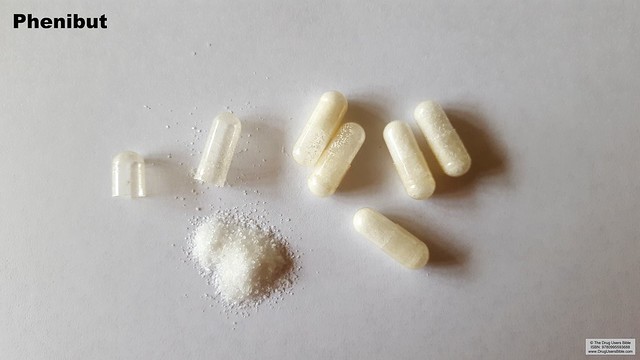Buy phenibut as a smart pill and it will quickly lead to addiction. Long-term use can reduce happiness and cognition. Learn more about phenibut dosage, high, and withdrawal here.
What is Phenibut and How Does it Work?
Phenibut is a drug that originated in Russia. It has been used since the 1960s according to the American Addiction Centers. Phenibut is used to treat anxiety, insomnia, depression, stuttering, irregular heartbeat, and post-traumatic stress disorder (PTSD).
Phenibut falls into the class of nootropics, or “smart drugs.” It is a synthetic version of GABA, one of the brain’s naturally produced chemicals. Over time, using phenibut will significantly decrease the brain’s ability to produce GABA on its own.
What is Phenibut HCL?
Phenibut HCl is phenibut enhanced with hydrochloride (HCl) salt. This modification makes the phenibut more stable and easier to handle, transport, and store. Phenibut HCl is the most commonly used form of phenibut and is soluble in water, has a slightly sour taste, and maintains the same pharmacological effects as pure phenibut.
Phenibut Dangers
Extended use of phenibut will, in essence, kill your brain’s mechanisms that allow you to experience positive emotions and functioning cognition.
Long-term use of phenibut, no matter the age, will significantly affect your quality of life.
If you are having challenges with phenibut addiction, treatment is just a phone call away. Contact Asheville Recovery Center at (828) 518-6996 to find out how we can help.
What Other Names Does Phenibut Have?
[table id=6 /]
What Other Drugs are Similar to Phenibut?
Phenibut is very similar to baclofen, gabapentin, piracetam, and diazepam in chemical composition. Some experimental findings for all of these drugs indicate changing levels of dopamine and other “feel good” receptors.
Is Phenibut Legal?
Phenibut is available as a supplement from many online stores and e-commerce sites, but it’s not FDA approved as a “dietary supplement” in the US even though manufacturers label them as such. It is often sold as a mood enhancer, sleep aid, booster for workout rehabilitation, and even a “smart drug.”
In fact, in April of 2019, the Federal Drug Administration (FDA) sent a warning letter informing 12 companies that they are violating the law by marketing their products as dietary supplements.
But by the time the FDA does human trials in order to approve a substance, there is another substance that is just a smidge chemically different from its predecessor, whether that substance was approved by the FDA or banned.

This is a common occurrence with synthetic substances such as bath salts that always seem to be available even though the FDA just banned one with a slightly different chemical compound. One molecule difference is all that is needed, and the new “old” synthetic drug is suddenly legal to buy.
By the definition outlined in the Federal Food, Drug, and Cosmetic Act, products containing this substance are, in fact, not a dietary supplement and are therefore misbranded.
Phenibut High
GABA (the chemical that phenibut mimics) in the brain regulates feelings of comfort and peace. When it’s taken in social settings, for instance, a person can experience reduced anxiety and nervousness and may have more control over feelings and thoughts. People who tend to over-think and who are excessively self-conscious may experience decreased neural processing.
Phenibut also has sedative effects and is said to decrease emotional negativity; however, there are physical and psychological consequences.
Phenibut Dosages
Phenibut is not regulated by the FDA, so there are no verified standardized dosage guidelines on how much to take; however, some companies provide recommendations based on the desired effects.
Most companies provide recommendations on how much phenibut to take but also say that a dosage that exceeds 2000 mg per day is not recommended because it can lower the heart rate and breathing rate as well as cause dizziness.
Phenibut Side Effects
Like most substances, the side effects of this drug can vary depending on the amount taken and other individualized factors like gender, weight, and the severity of any diagnosed or symptomatic mental health disorder such as depression and anxiety.
Possible side effects of phenibut can include:
- Nausea
- Sedation
- Irritability and agitation
- Headache
- Dizziness
- Motor impairment
- Loss of balance

Phenibut Addiction
Since you can buy phenibut online and it isn’t regulated by the FDA, there is a danger that access and misuse may go unchecked and addiction can develop. Because it’s easy to quickly build a tolerance, it’s much harder to stop using it.
There have been records of individuals using the compound to self-medicate. In order to deal with alcohol and benzodiazepine withdrawal symptoms, one person mixed phenibut with kratom.
A 2013 study suggested that overcoming a dependence on this dangerous substance can be extremely difficult as withdrawal entails a great deal of anxiety, irritability, and frustration. It took 24 weeks of therapy to place a person in complete remission from dependence.
Phenibut Withdrawal Symptoms
For people who want to stop taking it, the withdrawal symptoms can be very serious.
[table id=7 /]
The withdrawal timeline can last as long as two weeks, and withdrawal symptoms occur 3 to 4 hours after a dose.
Phenibut side effects and withdrawal symptoms can be very unpleasant. Dial (828) 518-6996 to speak with an Asheville Recovery Center representative to learn more about how we can help.
Phenibut Overdose and Deaths
Phenibut overdose symptoms include:
- Dizziness
- Grogginess
- Mood changes
- Vomiting
- Constipation
The Center for Disease Control and Prevention (CDC) releases a weekly morbidity and mortality report, and in early September, the report included a comprehensive analysis of calls to the American Association of Poison Control Centers between 2009 and 2019.
U.S. poison centers reported calls for 1,320 phenibut exposures from all 50 U.S. states and the District of Columbia between 2009-2019. The findings concluded that:
- 85 percent of calls originated from health care facilities
- 58 percent of exposures were among adults aged 18 to 34 years
- 75 percent of exposures were men
- 13 percent of exposures were life-threatening
- 10 percent of exposures were lethal
Phenibut may be called the “smart pill,” but if it inhibits your brain’s ability to produce a naturally occurring chemical (GABA) for warm fuzzies and cognition, then, after long-term use, it will become the “numb and dumb pill.”
It is clear that this substance is not safe, especially when taken in higher doses or used over extended periods of time since tolerance can develop very rapidly.
Explore your addiction treatment options today. Call Us to speak with an Asheville Recovery Center representative to begin your journey.






